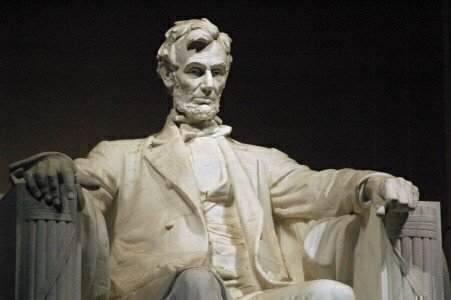In the Gettysburg Address, Abraham Lincoln called for “a new birth of freedom.” He wanted the freedoms defined in the Declaration of Independence extended to all Americans, including ex-slaves. In the last speech of his life, to a crowd on the White House lawn celebrating Lee’s surrender at Appomattox, Lincoln specifically addressed the right to vote, saying that he hoped blacks who were veterans and “very intelligent” might enjoy the franchise in Louisiana. John Wilkes Booth, who was in Lincoln’s audience, promised to kill him, which he did four days later.
 Were the abolition of slavery and federally-guaranteed black citizenship—the goals of the Reconstruction amendments—something brand-new in American life, or were they, as Lincoln said, extensions of what had gone before?
Were the abolition of slavery and federally-guaranteed black citizenship—the goals of the Reconstruction amendments—something brand-new in American life, or were they, as Lincoln said, extensions of what had gone before?
This is the case that Lincoln and other conservative revolutionaries made.
The inalienable rights which the Declaration of Independence described as “self-evident” applied to “all men.” Some of the units which George Washington, the first Commander-in-Chief led during the Revolutionary War were integrated (such as the 14th Massachusetts, which rowed him and his men across the Delaware before the battle of Trenton). Some states abolished slavery during the war; others began the process of manumission before the century’s end. The Northwest Ordinance of 1787 banned slavery in half of the trans-Appalachian west. The new Constitution allowed the foreign slave trade to be abolished after twenty years and did not use the words “slave” or “slavery” because, as James Madison argued, “it would be wrong to admit…the idea that there could be property in men.” During the struggle to ratify the Constitution, in 1788, free blacks voted in five states, including one southern slave state (North Carolina). Washington, the first president and first slave-owning president, freed his slaves in his will in 1799.
Of course, there were huge omissions and backsliding even in the Founding era. The Constitution privileged slavery, even if it did not name it, counting slaves in apportioning the House of Representatives and the Electoral College, and providing that slaves who escaped to free states had to be returned. In a debate on the slave trade in the First Congress Rep. James Jackson of Georgia made one of the earliest political arguments for slavery as a positive good, “commended” by the Bible. The Militia Act of 1792 defined white men as the pool of potential soldiers; there would be no black units until the Civil War, no integrated ones until the Korean War.
Event Notice (12/7 in Washington, D.C.): The Thirteenth Amendment At 150: Emancipation, America’s Second Founding
Lincoln believed that, as time passed, America’s commitment to its founding principles had faded. New free states were added to the Union as the country grew, but so were new slave states, and old slave states no longer turned to freedom (a belated proposal for manumission in Kentucky in 1849 failed by a wide margin). The idea that slavery was a good thing became dogma in the south, and was tolerated in much of the north; Lincoln’s old acquaintance and rival Stephen Douglas said the Declaration applied only to white men, and that the country could remain half slave and half free “forever.” Slavery was woven into the institutions of one third of the country, and into the economy of all of it. In 1854 Lincoln made the gloomy assessment that “our republican robe is soiled, and trailed in the dust.”
Still after four years of fighting and 750,000 deaths, four million slaves were freed and put on a path to citizenship. The nation could not have made such a titanic effort if enough Americans had not believed that they were fighting for something they already believed in. Accident, backlash and exhaustion lengthened the path to full citizenship by ninety to a hundred years. But the civil rights victories of the 1950s and 1960s also could not have been won if they had not been seen as measures that America owed itself—what Martin Luther King called the “promissory note” of the founding.
Call it the Second American Revolution, but maybe better call it the American Revolution 2.0.
Richard Brookhiser is an American journalist, biographer and historian, and the author of "Founders’ Son: A Life of Lincoln." He is a senior editor at National Review. This commentary is part of an effort with the Constitutional Accountability Center, a think tank, law firm, and action center dedicated to fulfilling the promise of the Constitution’s text and history, to mark our Nation’s Second Founding. For more on these efforts to celebrate its 150th anniversary, please visit SecondFounding.org and follow @2ndfounding on Twitter.







